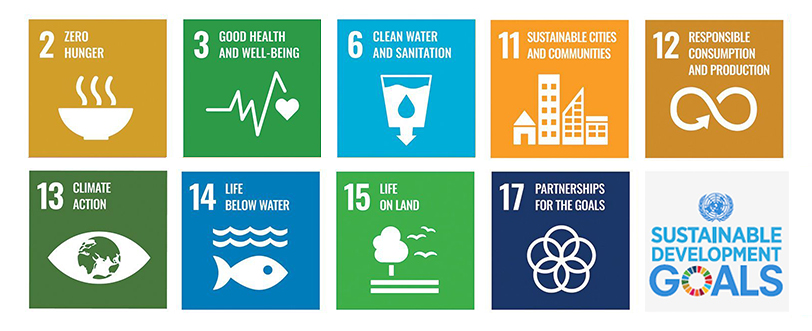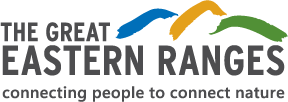Connectivity conservation provides one of the most comprehensive, integrated nature-based solutions (NbS) to the greatest threats that humankind and the environment that sustains us face – climate change, biodiversity loss and disease spread.
By protecting, connecting and restoring landscapes at the continental scale, the Great Eastern Ranges (GER) and other large landscape conservation endeavours around the globe are reversing habitat loss and degradation; aiding the movement and adaptation of plants and animals; reducing carbon emissions; and supporting the environmental services that underpin our health, economies and livelihoods.
Through our work, GER contributes towards the achievement of the following national and international environmental, sustainability, economic and social goals:
UN Decade on Ecosystem Restoration (2021-2030)

The devastating 2019-2020 bushfires and the COVID-19 pandemic are a stark reminder that there has never been a more urgent need for us to restore our degraded landscapes and ecosystems for the benefit of nature and people. This need has been recognised in the United Nations Decade on Ecosystem Restoration (2021-2030); a decade aimed at building a strong global movement to prevent, halt and reverse the degradation of ecosystems on every continent and in every ocean. GER has joined other prominent Australasian environmental restoration organisations in a consortium to collaboratively support and help achieve the objectives of this important decade.
The Convention on Biological Biodiversity and Post-2020 Biodiversity Framework
The Convention on Biological Diversity (CBD) is a global treaty aimed at conserving biodiversity, its sustainable use, and the fair and equitable sharing of the benefits provided. The CBD ‘Post-2020 Global Biodiversity Framework’ that will be adopted in 2021 will set the transformational targets, indicators and measures needed to effectively halt biodiversity loss and put nature on a path to recovery by 2030. GER’s work contributes by helping to curb the loss of Australia’s unique species; a significant 1,000 of which are at risk of extinction due to ongoing loss and fragmentation of habitat, feral animals, weeds, climate change and other threats. With 84% of our mammals, 45% of our birds and 89% of our inshore fishes found nowhere else on Earth, we cannot afford any further losses and GER is working hard to ensure we don’t.
Climate change and the Paris Agreement
To avoid the rapid, far-reaching and unprecedented impacts that unchecked climate change will result in, countries across the world have committed to limit global temperature rise to below 2 degrees Celcius (ideally 1.5 degrees Celcius) under the Paris Agreement. Connectivity conservation initiatives like GER, provide large-scale, integrated natural solutions to achieving this critical goal and to curbing the catastrophic impacts of climate change.
Sustainable Development Goals (SDGs)
The 17 global Sustainable Development Goals (SDGs) adopted by all United Nations Member States in 2015 provide a blueprint for peace and prosperity for people and the planet, now and into the future. GER and its partners contribute towards achieving these vital goals by advancing nine SDGs:

Sharing of knowledge and expertise
To advance and deliver leading-edge science and practice, GER collaborates with other connectivity conservation initiatives, organisations and universities in Australia and around the globe.
Partnership with Gondwana Link
In 2019, GER and Gondwana Link Limited were awarded a significant grant by The Ian Potter Foundation to deliver the ‘Connecting communities and habitats at scale in Australia’ project. The three-year project is enabling us to advance our efforts to bring people together; coordinate resources; build knowledge and capacity; deliver best available science and expertise, and facilitate a national approach to connectivity conservation.
IUCN Connectivity Conservation Specialist Group
The IUCN WCPA Connectivity Conservation Specialist Group (CCSG) brings together over 900 volunteer members from 120+ countries to advance connectivity conservation science, policy, and practice. Several GER Board members, staff and partners have been involved in CCSG since its establishment in 2016. They contribute to the global specialist group by sharing expertise, knowledge and lessons learnt, supporting capacity building, and delivering and promoting the IUCN ‘Guidelines for Conserving Connectivity through Ecological Networks and Corridors’.
CALLANZ
The Conservation across Large Landscapes Australia New Zealand (CALLANZ) network was established in 2019 to boost the practice and science of connectivity conservation in Australasia through the sharing of knowledge, tools and lessons learned. CALLANZ currently comprises the Great Eastern Ranges and Gondwana Link in Australia, and Reconnecting Northland in New Zealand, with the intention of expanding the network to include other existing and emerging connectivity conservation initiatives in the future.
EcoHealth Network
Our personal, social, cultural and economic health are inextricably linked with nature. A healthy, thriving environment provides us with a diversity of vital benefits, including fresh air and water, pollination services and healthy soils, and helps to mitigate the impacts of the climate crisis. To raise awareness of the health-nature connection, and increase the effectiveness of ecological restoration globally, GER is a member of the global EcoHealth Network. Learn more.



 CONNECTIVITY CONSERVATION EXPERT
CONNECTIVITY CONSERVATION EXPERT 